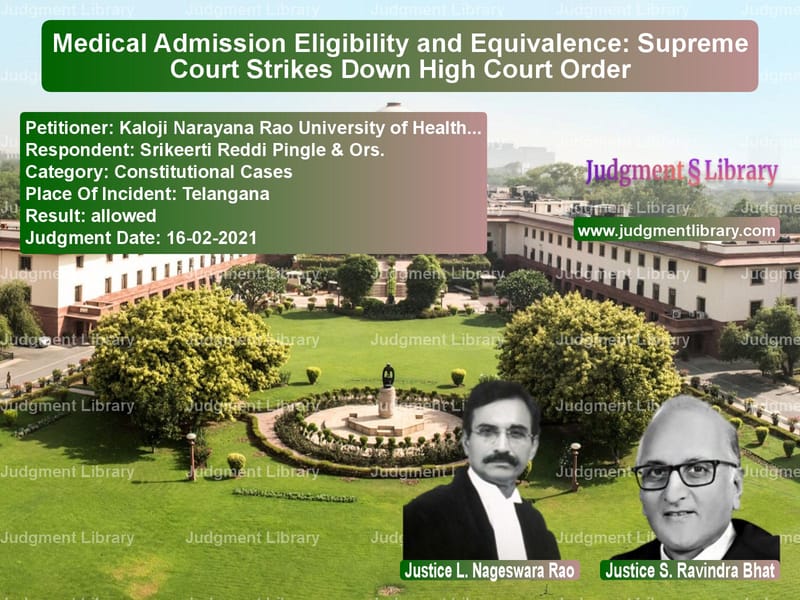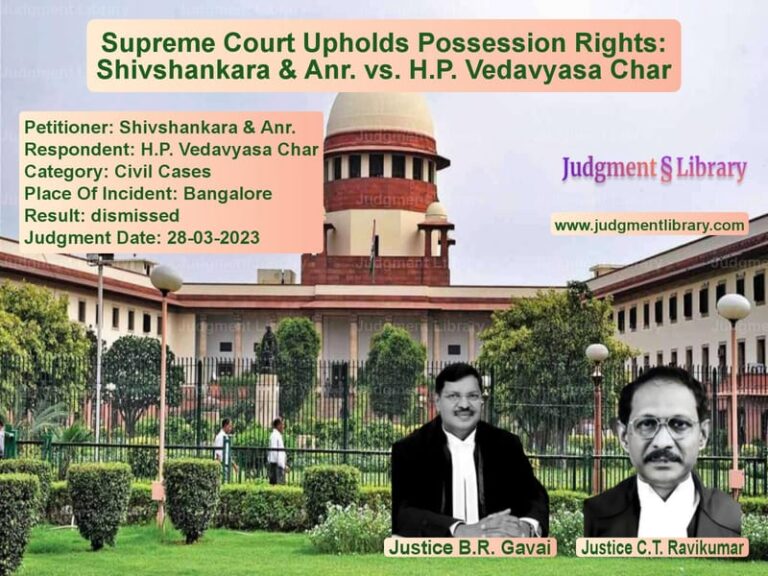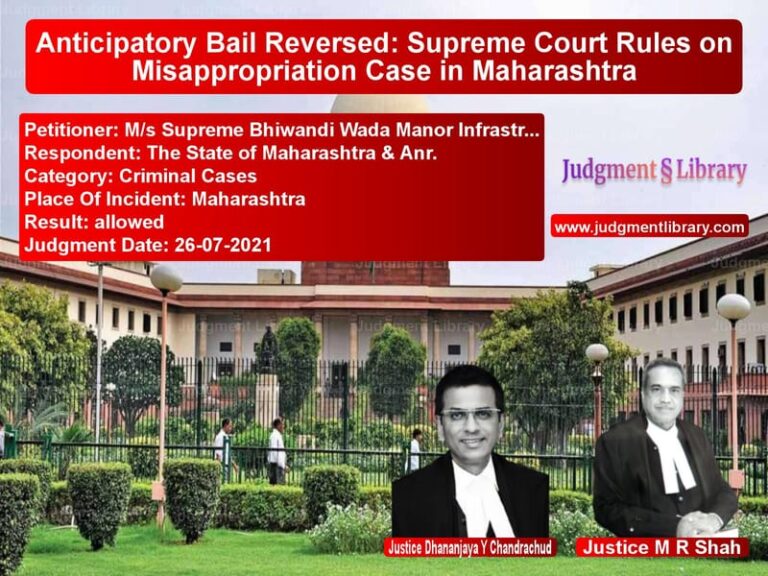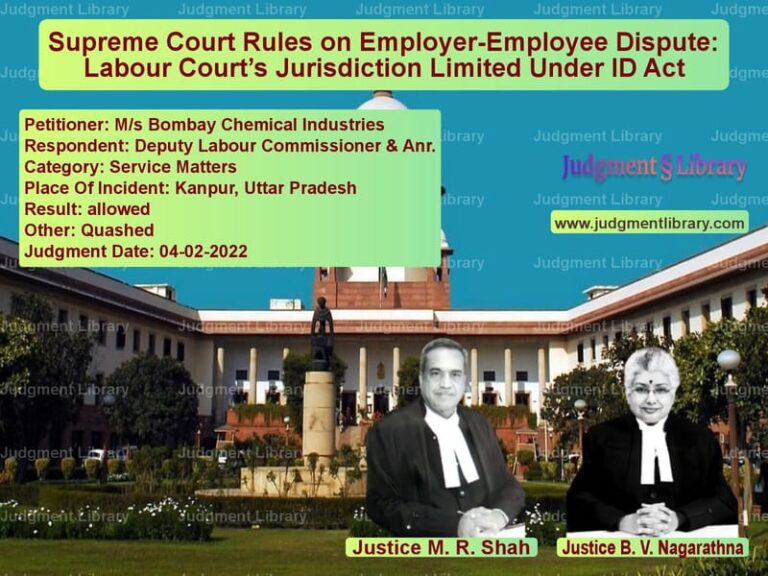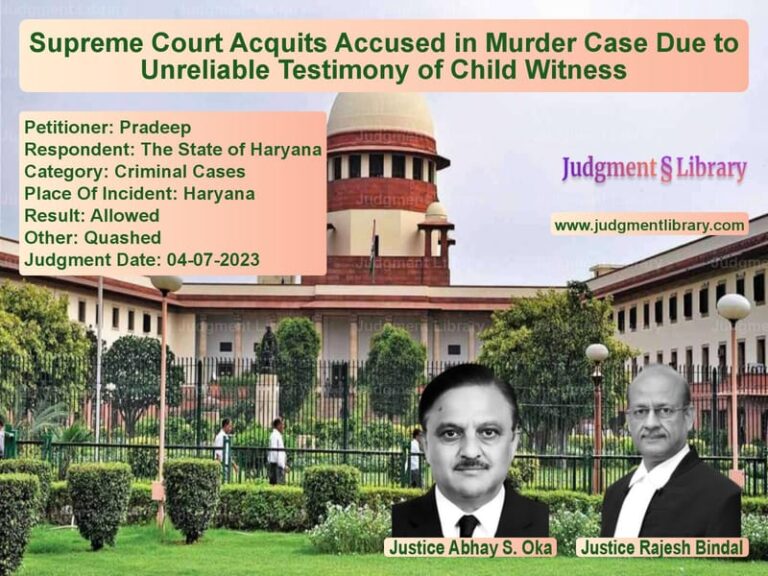Medical Admission Eligibility and Equivalence: Supreme Court Strikes Down High Court Order
The Supreme Court of India, in a significant ruling, overturned the Telangana High Court’s decision in the case of Kaloji Narayana Rao University of Health Sciences vs. Srikeerti Reddi Pingle & Ors., establishing a precedent for determining eligibility for medical admissions based on equivalency standards. The case revolved around the eligibility of an NRI student for admission to the MBBS course for the academic year 2020-21.
Background of the Case
The respondent student, Srikeerti Reddi Pingle, applied for admission under the management quota for NRI candidates at Kaloji Narayana Rao University of Health Sciences. The university initially published a list of candidates and noted that the respondent had not furnished proof of having studied Biological Sciences in her 10+2 equivalent qualification.
The student provided a letter from the Consulate General of India in New York stating that she had successfully completed the 12th grade from Conrad High School in Connecticut and that it was equivalent to the Pre-University (Two Year Course) and the Senior Secondary Board Examination Certificate of India. Additionally, she obtained a certificate from the Telangana State Board of Intermediate Education, confirming the equivalence of her qualification to the Intermediate Examination conducted by the Board.
Legal Proceedings in the High Court
Challenging the University’s decision to reject her admission, the student approached the Telangana High Court, which ruled in her favor. The High Court relied upon the equivalency certificate and the letters from her school, concluding that she had completed her 12th grade with Biological Sciences and met the eligibility criteria set by the Medical Council of India (MCI).
University’s Argument Before the Supreme Court
The University contended that the student had not provided adequate proof of studying Biological Sciences as a core subject in both years of her 10+2 education. The Additional Solicitor General for India (ASG) pointed to Regulation 4(2) of the MCI Regulations on Graduate Medical Education, 1997, which mandates that students must have studied Physics, Chemistry, and Biology/Biotechnology at the 10+2 level.
The University argued that:
- The student’s records indicated that she had taken an Advanced Placement (AP) Biology course during her 10th grade, which does not satisfy the requirement of two years of study in the subject.
- The equivalency certificate from the Telangana Board only affirmed that the U.S. 12th-grade diploma is equivalent to an Indian 10+2 certificate but did not certify that the student studied Biological Sciences in the required manner.
- The University acted within its rights by rejecting the student’s admission due to the lack of evidence proving her eligibility.
Student’s Defense
The student’s counsel argued that:
- The Telangana State Board of Intermediate Education had already recognized her qualification as equivalent to the Intermediate Examination in India.
- Regulation 4(2)(f) of the MCI Regulations allows recognition of foreign qualifications equivalent to the Indian 10+2 system.
- Her Advanced Placement (AP) Biology course was equivalent to a first-year college-level Biology course, satisfying the eligibility criteria.
- Similar cases had been decided in favor of students with foreign qualifications, where courts held that equivalency certificates issued by recognized authorities should be considered sufficient proof.
Supreme Court’s Observations
The Supreme Court undertook a detailed examination of Regulation 4(2) of the MCI Regulations and observed:
- The regulations require that candidates must have studied Physics, Chemistry, and Biology for two full years at the 10+2 level.
- The student had only taken AP Biology in 10th grade, which was insufficient to meet the eligibility requirements.
- Regulation 4(2)(f) mandates not just equivalency in terms of educational structure but also equivalency in subject-specific study.
- The Telangana Board’s equivalency certificate did not specifically certify that the student had studied Biology for two years, making it inadequate proof of eligibility.
The Supreme Court ruled that:
“The equivalence in qualification is not merely at the level of a 10+2 requirement but requires equivalence in scope and standard, where the candidate must have undergone two years of study in Physics, Chemistry, and Biology, including practical training in each subject.”
Key Legal Findings
- Requirement of Two Years of Subject Study: The court emphasized that merely possessing a 10+2 equivalency certificate is not sufficient; the student must demonstrate that they studied Biology for two years at the senior secondary level.
- Interpretation of Regulation 4(2): The judgment clarified that all sub-clauses of Regulation 4(2) should be read together, and subject requirements must be met irrespective of equivalency certificates.
- Rejection of High Court Ruling: The Supreme Court found that the High Court erred in solely relying on the equivalency certificate without verifying subject-specific study.
- Implications for Future Admissions: The decision ensures that medical admissions in India strictly adhere to subject requirements, preventing admissions based on broad equivalency certificates without subject verification.
Impact of the Judgment
This ruling has several implications for medical admissions and foreign-qualified students:
- Indian universities will now require strict compliance with subject-specific eligibility criteria, ensuring that students meet all academic requirements before being granted admission.
- Foreign students applying for medical programs in India must provide detailed proof that they have studied Biology for two full years at the 10+2 level.
- Equivalency certificates will no longer be considered sufficient proof unless they explicitly confirm subject-wise eligibility.
- The ruling reinforces the importance of standardized admission criteria, ensuring that all candidates, regardless of their educational background, meet the same eligibility requirements.
Conclusion
The Supreme Court’s decision in this case sets an important precedent in medical education in India. By prioritizing subject-specific eligibility over broad equivalency recognition, the ruling ensures that all students, whether domestic or foreign, meet uniform academic standards before gaining admission to MBBS programs.
Read also: https://judgmentlibrary.com/maharashtras-gond-gowari-tribe-dispute-supreme-courts-landmark-verdict/
For aspiring medical students with foreign qualifications, this decision highlights the necessity of verifying eligibility requirements in advance and ensuring compliance with the specific subject mandates outlined in the MCI regulations. It also underscores the judiciary’s role in maintaining transparency and fairness in professional education admissions.
Petitioner Name: Kaloji Narayana Rao University of Health Sciences.Respondent Name: Srikeerti Reddi Pingle & Ors..Judgment By: Justice L. Nageswara Rao, Justice S. Ravindra Bhat.Place Of Incident: Telangana.Judgment Date: 16-02-2021.
Don’t miss out on the full details! Download the complete judgment in PDF format below and gain valuable insights instantly!
Download Judgment: kaloji-narayana-rao-vs-srikeerti-reddi-ping-supreme-court-of-india-judgment-dated-16-02-2021.pdf
Directly Download Judgment: Directly download this Judgment
See all petitions in Fundamental Rights
See all petitions in Constitution Interpretation
See all petitions in Public Interest Litigation
See all petitions in Legislative Powers
See all petitions in Judgment by L. Nageswara Rao
See all petitions in Judgment by S Ravindra Bhat
See all petitions in allowed
See all petitions in supreme court of India judgments February 2021
See all petitions in 2021 judgments
See all posts in Constitutional Cases Category
See all allowed petitions in Constitutional Cases Category
See all Dismissed petitions in Constitutional Cases Category
See all partially allowed petitions in Constitutional Cases Category

